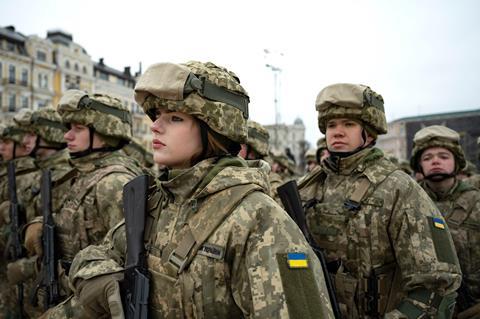Amid growing conflict in the Middle East and continued aggression in Ukraine, rumours of a third world war and conscription abound. How should Christians respond in a time of deepening international crisis?

The news is full of wars and rumours of wars. Tensions escalate daily in the Middle East; Russia and China flex their muscles and, this past weekend, the head of NATO accused Donald Trump of undermining Western security with his latest inflammatory comments.
Alongside this, we read a stream of panicky stories about funding and recruitment crises in our armed forces and the possible reintroduction of conscription.
No wonder fears of a third world war are rising. To a generation raised on the nostalgia of the second world war, the prospect of actually being involved in a similar scale conflict – amplified by the development of nuclear, chemical and biological weapons – is terrifying.
A response to war
How should we think about the concept of war? There are two main Christian approaches:
The first is pacifism – the idea that taking up arms is wrong in all circumstances. This view emphasises Jesus’ command to love our enemies, and his yielding to the Jewish and Roman authorities. He could have called down armies of angels to rescue him, but he chose to submit.
The second approach builds on ‘just war theory’ which teaches that some conflicts can be morally justified. In order for a war to be just, the cause must be righteous, the response must be proportionate and there must be an expectation of a successful outcome. This view holds that it is legitimate for Christians to join the armed forces as servants of the authorities instituted by God to keep order (see Romans 13).
What both these views have in common is their agreement with the idea that vengeance belongs to the Lord (see Deuteronomy 32:35). We should never act out of rage or for revenge. God requires justice but he tempers retribution with mercy.
We cannot bring peace by our own efforts, so we must stand on God’s promise to renew all things
These concepts give us a framework for thinking about how we might respond, should our country ever go to war again. But we also pray this situation will not arise.
It is tempting to perhaps withdraw - to ignore the news - as a way to cope with our fears (and for some, this may actually be important to protect our mental health). But I want to encourage you to take comfort in Jesus’s words in Matthew 24:6: “You will hear of wars and rumours of wars, but see to it that you are not alarmed.” A constant refrain throughout the Bible (often spoken by angels) is: “Do not be afraid.”
Instead, ask for God’s peace, and channel your concerns into positive action. Philippians 4:6-7 tells us: “Do not be anxious about anything, but in every situation, by prayer and petition, with thanksgiving, present your requests to God. And the peace of God, which transcends all understanding, will guard your hearts and your minds in Christ Jesus.”
But first, pray
First and foremost then, we should be praying. I don’t just mean sending up occasional arrow prayers, but properly interceding for the desperate situations we see around the globe. We should be crying out to God for the world that he loves: for wisdom, restraint and mercy – for governments and rulers; freedom, deliverance and peace.
Secondly, as Christians we are called to be active peacemakers: to engage in our communities and political life; to model reconciliation and not stoke division.
John Stott, in his classic work, Issues Facing Christians Today (Zondervan), tells us what this should look like: Christ “means his Church to be a sign of his kingdom, that is, a model of what human community looks like when it comes under his rule of righteousness and peace.”
“An authentic Kingdom community,” he continues, “will then challenge the value system of the secular community and offer a viable alternative… The influence for peace of communities of peace is inestimable.”
God requires justice but he tempers retribution with mercy
And as we engage, we need to continually be aware of how we perceive others. The more we are suspicious towards those who do not seem like us, the easier it is to fuel division, and the easier it then becomes to justify aggression. This is why I speak out so often against any policy or line of argument that portrays any group of people as less than human. All are made in the image of God.
Finally, we need to remember the hope that we have. The world is fallen. We cannot bring peace by our own efforts. So we must stand on God’s promise to renew all things.
Let’s turn the words of Isaiah 2:3-4 into our prayer for today: “The law will go out from Zion, the word of the Lord from Jerusalem. He will judge between the nations and will settle disputes for many peoples. They will beat their swords into ploughshares and their spears into pruning hooks. Nation will not take up sword against nation, nor will they train for war any more.” Amen.





































No comments yet